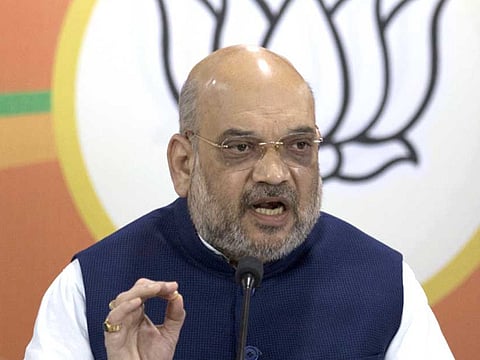Is the BJP chief whistling in the dark?
Amit Shah’s proud proclamation to remain in power for 50 years may not be far-fetched, but it would be perilous to take the Indian voter for granted

India’s ruling Bharatiya Janata Party (BJP) president Amit Shah’s boast about the party ruling for 50 years is in keeping with his usual aggressive style. But the extravagant claim at the party’s national executive meeting can be interpreted in two ways: It could be a sign of arrogance, or whistling in the dark to keep up the party morale.
If the assertion underlines hauteur, the reason undoubtedly is the BJP’s belief that it faces no serious challenge. Notwithstanding the continuing unemployment, agrarian distress, high fuel prices, falling rupee, stagnant exports and the unease among the minorities and Dalits (lower castes), the opposition has not been able to get its act together.
This failure has sowed doubts about its prospects in the upcoming assembly elections in Rajasthan, Madhya Pradesh and Chhattisgarh. More so because the Congress, the BJP’s main opponent in these states, will not have it easy as expected since the party could not reach an agreement with the Bahujan Samaj Party (BSP). It is also troubled by its familiar internal squabbling. Besides that, the opposition is yet to decide on a prospective prime minister and there hasn’t been a clear articulation of an economic blueprint.
This is in stark contrast to the BJP, which is pursuing a well-defined path. Even as “vikas” (development) remains its catchphrase, it also cannily indulges in fomenting divisiveness. That has been highlighted by the communal uncertainties posed by the National Register of Citizens, which the Assam Chief Minister Sarbananda Sonowal wants to be extended from his state to the entire country so that the “ghuspetiyas” (infiltrators or illegal immigrants) can be summarily evicted. “Chun chun ke nikaloonga,” (will evict them, one by one) Amit Shah had thundered.
The BJP is confident that the promise of development will keep the youth and the middle class on its side and the nationalist plank targeting “ghuspetiyas” and the so-called “urban Naxalites” will keep the opposition off balance. The opposition seems to have no answers to the allegations of being soft on illegal aliens and Maoist sympathisers, and has to depend on the judiciary to keep any excesses of the ruling party in check as in the matter of lynchings. The BJP’s indifference towards the lynchings or the disquiet expressed by the “secular” intelligentsia about its rule was evident in Shah, who derived satisfaction from his party’s winning streak despite the murder of Mohammad Akhlaq (allegedly for eating beef), or the “award wapsi” (returning awards as a protest) of the urban elite.
Unsurprisingly, Shah believes that a promise of economic growth and depiction of the opposition as unpatriotic will keep the “lion” safe from the “wild dogs”, to quote the similes used by Rashtriya Swayamsevak Sangh (RSS) chief Mohan Bhagwat while addressing the World Hindu Congress in Chicago to describe the Sangh Parivar (the saffronite family) and its opponents.
The RSS has been broadening its appeal by calling the non-saffronites to its conclaves. A possible mainstreaming of the avowedly pro-Hindu organisation will help the BJP shake off the taint of its association with the RSS and thereby help in the fulfilment of the dream of ruling India for half a century.
The party has a prime minister whose popular appeal is testified by virtually all the opinion polls despite the government’s palpable inadequacies. It also has a chief whose micromanagement of the organisation has turned it into a formidable election-winning outfit. The BJP’s publicity is boosted not only by its members in the government and the party, but also by an army of trolls who pounce on its critics. The ruling dispensation is also supported by some ‘nationalist’ television channels whose commitment to neutrality is absent.
With so much in the BJP’s favour, its 50-year project may not seem far-fetched — except that the Indian voter remains famously inscrutable. Since the BJP did not secure more than 31 per cent of the votes at the height of its popularity in 2014, it is obvious that a large percentage of the population does not think much of the party. This inconvenient fact may have prompted Shah to whistle in the dark.
— IANS
Amulya Ganguli is a political analyst in India.



